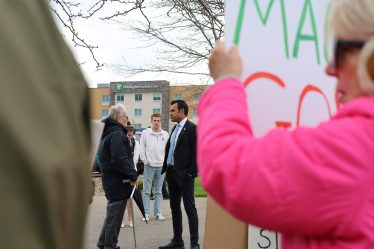Campus Master Plan Working Group presents ideas for future projects
Ramsey Kincannon
News Editor
With the $30 million Scot Center completed, the Board of Trustees has shifted its focus to future projects designed to augment The College of Wooster campus and community. With some ideas in mind, Chief Information and Planning Officer Ellen Falduto and Economics Professor John Sell hosted a forum in order to solicit student feedback on some of these ideas. While the Board of Trustees and the College administration are the only ones in charge of capital spending, the students’ comments are apparently being taken into account.
Some of the improvements on campus since 1999 include the demolition of Hygeia Hall, constructing Morgan Hall, overhauling Kauke Hall, building the Student Wellness Center, making landscape improvements to College Ave. and University St., erecting Bornhuetter Hall and Gault Manor, renovating Lowry, and the recent construction of the Scot Center.
As the meeting started, Sell and Falduto introduced the strategic priority of all future goals, which reads: “[Wooster’s expectations from proposal requests are those] that maintains the spirit and character of the campus, while addressing its immediate physical need, and establishing a long term campus renewal/replacement strategy. The Plan must clearly identify a long term vision of the campus reflective of the College’s position as the nation’s premier liberal arts college for undergraduate research. The campus master planning process shall provide the opportunity for the College to reflect upon its history and heritage, to assess its current condition and needs, and to create a vision to prepare for all future growth. The charted course for the development of Wooster’s campus’ lands and facilities in preparation for the future in three phases of planning: short-term (0 to 5 years), mid-term (5 to 10 years) and long term (10 to 20 years).”
With that strategic priority in mind, the campus faces some challenging decisions to make in the future. According to the Campus Master Plan Working Group, which consists of students, professors and administrators, there are several themes worth addressing.
Among other plans are classroom utilization, faculty offices, infrastructure/sustainability, Kitteredge Hall, land resources (including the golf course), modernizing Lowry Center, Mateer Hall, and McGaw Chapel, parking, continuing to improve the PEC, and student housing. All of these areas had several proposals attached to them. In order to determine which issues to prioritize, the Campus Master Plan Working Group weighed each option based on how urgent it was and how relevant it was to the strategic proposal. If something were more urgent that also fit Wooster’s plan for the future, that idea was discussed — such as making Wooster more handicap accessible (Galpin, for instance, is one of several buildings that are handicap inaccessible), creating a new advising center, and upgrading some campus buildings.
Wooster students felt strongly about science improvements, initiatives that connected the College and the community, converting the coal plant to something more environmentally friendly and renovating student dorms instead of building new ones. The committee is unsure when future construction plans will be announced.

